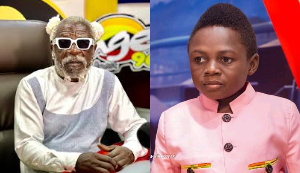One fundamental pillar that mankind has built to safeguard his humanity and dignity is the institution of democracy as the way forward for governance and the (re)distribution of societal resources. For this institution to be of any value there is the need for those concerned to also safeguard it in turn.
One area that society can play a crucial role to deepen democracy is to always develop resources in line of succession ready to lead, organise, manage and control at any point in time. Hence, effective and well coordinated succession is one key ingredient for participatory democracy.
In our part of the world where people are on the neck of the other to succeed and where individual interests runs supreme to that of the society, it is important that effective machinery is put in place to safeguard institutional development from the various interests that ‘think they have the capacities to lead’.
Yes it is true democracy is about allowing all interests to exhibit their capacities, but we cannot just open up ourselves for ‘every force’ to ‘participate’ in every decision of collective interest. There are limits as to what each of us can go. Do we ask why the 1992 Constitution pegs the minimum age of any would be president at 45 years?
It is because even in the spirit of constitutional democracy there are certain conditions that will automatically bar some sections of the society to exhibit their talents under certain circumstances. That makes us human and that shows how orderly we want the society to develop.
As a society we have failed our constitutional democracy by not institutionalising succession to leadership position effectively through our political institutions upon whose feet our democracy runs. Succession has become a thorny area no one wants to talk about. Hence, money, power and connection have become the ‘unfortunate efficient mechanism’ to decide who should succeed who in the event of a leadership vacancy.
Performance, individual capacities and abilities, and ones determination to change society are on the fringes of our democracy. We seem to care little about those who ‘pastor’ us. All that we are interested in is whose succession will benefit our individual whims and caprices.
The Bible cautions us to be wary about those who pastor us, as the kind of leadership will certainly determine the direction of our society.
The current malice surrounding the NPP leadership for the 2008 elections should signal to us that we are on the brink of denting our fledgling democracy due to the number of people aspiring to lead the party. There is an Akan adage which goes “too much fish/meat spoils the soup.” This means having more than what you need at a go causes havoc. The fact that we want to develop effective participatory democracy does not mean we should not put certain mechanisms in place to check the influx of our numbers into certain vital areas of decision making.
There are thousands of young and dynamic leaders within our political parties of less than 45 years who can provide much needed and life-saving leadership qualities to confront our escalating problems, yet the constitution does not allow them to do so. Can we say the constitution is biased and only favours the elderly? It only wants to safeguard our collective interests through a process of effective resource utilisation, especially that of human resources.
For us to deepen our democracy and development it is important that our political institutions and all other institutions of civility should be very proactive on working out effective mechanisms that identify the best resources at any point in time ready and capable of succeeding in our leadership vacancies without going through such acrimonious and money-conscious process of leadership succession as we are experiencing within the NPP.
The exponential growth in the number of people seeking political positions within our parties and beyond should be of concern to every Ghanaian. If just after 7 years 17 people can boast of having what it takes to be president of Ghana then we should begin to look beyond 2012 how many more will be in the bandwagon. During that period not only the NPP will suffer such defective succession system, but NDC, CPP, PNC and all the so called political parties (old and yet to be formed) will experience such problem.
It is time also for us to accelerate the development of the younger generation within our political parties. We must begin the business of political party development with all the earnest it deserves. The current state of affairs in which political party activities are of any significance only during electioneering periods needs to be given a second thought.
Democracy needs to be succeeded. And such success comes about when at any point in time we have the right calibre of people ready to lead. Allowing forces to fight and destroy themselves just for one position undermines democracy. This calls for political education so that people will begin to understand why in spite of their resources there is someone who can really be identified with the ideology and principles making the party a brand worth supporting.
However, unfortunate the NPP saga is, I believe it has given us a food for thought so that we look into the future with all the necessary safeguards for the sake of our democracy. Succession is key to unlock our democratic progress.
















